November 2010 Archives
In early November, we featured an article by SAGE Ambassador and Sustainability Council member Cheryl Rusnak, "From trees to furniture: a case study of how trees from the Mansueto Library construction site were put to purposeful re-uses." Now, we are pleased to share even more photos from the project. All the credit goes to the committed folks at the Library!












Completed Ash benches are near Regenstein Library Circulation. (Photo by Cheryl Rusnak)

Memorial Trees blooming. (Photo by Jane Ciacci)

Memorial Crab Apple Trees planted in a new location north of 56th Street between the Smart Museum and Young Memorial Building. (Photo by Cheryl Rusnak)

Mansueto construction site preparatory work begins before tree removal. (Photo by Cheryl Rusnak)

Logs from trees in storage at Horigan Urban Forest Products, Inc. (HUFP). (Photo by Cheryl Rusnak)

Logs milled by Bruce Horigan and HUFP employee in North Chicago. (Photo by Cheryl Rusnak)

Scott Chambers and Judi Nadler pose with a board of Maple that will be used for the top of a side table. (Photo by Cheryl Rusnak)

A bench in progress in Scott Chamber's work shop. (Photo by Cheryl Rusnak)

Closet doors, conference table, and side table in the Library Director's Office. (Photo by Cheryl Rusnak)

Completed benches are on the first floor of Regenstein Library. (Photo by Cheryl Rusnak)

The Maple side table by a window in the Library Director's Office. (Photo by Cheryl Rusnak).
It's that time of year again! Home heating can account for nearly half the average family's winter energy costs. This winter, try out these tips to stay warm and toasty while saving energy and your pocketbook.
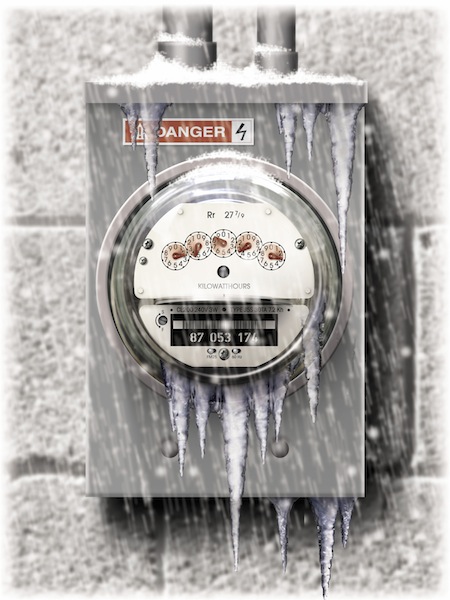
Finally, and perhaps most importantly, dress for the weather. Before turning up the thermostat, try throwing on an extra layer. Everyone's experience of heat and cold is different and because entire buildings are often on the same ventilation and temperature control system, individual adaptation is key to staying comfortable.
If you just can't get warm enough, get a space heater to use as needed--just be sure to choose an Energy Star model!

- Securely close and lock all windows for the duration of the heating season
- Prevent heat loss through your windows by covering window air conditioning units or storing and removing them*
-On campus, call the Work Center (campus extension 4-1414); there will likely be a charge associated with covering an air conditioner
- Install storm windows
-At home, do it yourself or ask your landlord
-If you live in one of the older campus residence halls that have storm windows (Blackstone, Breckinridge, Broadview, Maclean, or Snell-Hitchcock), be sure to close them all the way to prevent draft
- If you don't have storm windows, instead use plastic to cover and seal around your windows
-On campus, call the Work Center (campus extension 4-1414); there will likely be a charge associated with this procedure
- Check for and seal air leaks to minimize drafts
- Stop under-door drafts by attaching a vinyl sweep or "door snake" (a long cloth tube filled with sand) to the bottom of your doors. You can also use a rolled up towel
- At home, install a programmable thermostat. An Energy Star model can cost as little as $30 while offering the potential savings of over $100 per year
Finally, and perhaps most importantly, dress for the weather. Before turning up the thermostat, try throwing on an extra layer. Everyone's experience of heat and cold is different and because entire buildings are often on the same ventilation and temperature control system, individual adaptation is key to staying comfortable.
If you just can't get warm enough, get a space heater to use as needed--just be sure to choose an Energy Star model!
For more winterizing tips from the Union of Concerned Scientists, click here.
*Note that in Residential Services buildings, removal of air conditioning units is required by Nov. 1st.
*Note that in Residential Services buildings, removal of air conditioning units is required by Nov. 1st.
Guest post from Ari Epstein, a SAGE Ambassador and a fourth year in the College. Click here for part one of the series.
Once the school year began and more fraternity brothers returned to campus, I shifted my focus to fraternity-wide events like socials, parties, and the like. I often saw tons of aluminum cans and paper cartons lining the floors of rooms in which the fraternity hosted social activities, so I designated an old trash bin to be used only for recycling. I taped one of the SAGE recycling tip sheets to one side of the bin, while the other side has taped-on letters spelling "RECYCLING!". I also tried to avoid the unpleasant task of resorting recycles and non-recyclables during party clean-up shifts by placing recycling containers only where they are in highest demand. In order to avoid a space problem, I tried not to place recycling and garbage bins in the same rooms. Therefore, I placed recycling bins in the rooms where refreshments are served in recyclable containers, while I placed only garbage bins in the areas only serving refreshments in disposable cups.
Once the school year began and more fraternity brothers returned to campus, I shifted my focus to fraternity-wide events like socials, parties, and the like. I often saw tons of aluminum cans and paper cartons lining the floors of rooms in which the fraternity hosted social activities, so I designated an old trash bin to be used only for recycling. I taped one of the SAGE recycling tip sheets to one side of the bin, while the other side has taped-on letters spelling "RECYCLING!". I also tried to avoid the unpleasant task of resorting recycles and non-recyclables during party clean-up shifts by placing recycling containers only where they are in highest demand. In order to avoid a space problem, I tried not to place recycling and garbage bins in the same rooms. Therefore, I placed recycling bins in the rooms where refreshments are served in recyclable containers, while I placed only garbage bins in the areas only serving refreshments in disposable cups.
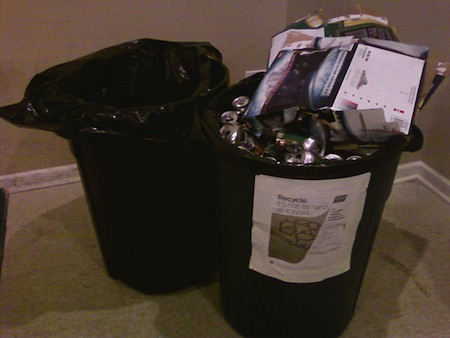
Overflowing recycling bin next to a trash can after a recent AEPi party
As the pictures demonstrate, not only do AEPi members spend less time sorting during clean-up shifts, but, in the rooms where I provided garbage and recycling bins without compromising space, party patrons generally sorted items without issue. Even more, other AEPi members donated old towels to use as mops and cleaning rags instead of paper towels. Since O-Week when we started using the towels, we have yet to use more than 1 roll of paper towels during four different cleaning shifts that covered nearly 4,000 square-feet of space.
A greener clean-up at AEPi
AEPi is committed to being a model for how other campus organizations can become more sustainable. To learn more about there efforts, contact Ari at aepstein11@uchicago.edu.
Guest post from Ari Epstein, a SAGE Ambassador and a fourth year in the College.
Before I became a SAGE Ambassador at the end of Spring Quarter last year, I contacted the Office of Sustainability on behalf of the Alpha Epsilon Pi (AEPi) fraternity. Because of my interest in reforming in-house and party practices to be more environmentally conscious, the fraternity elected me to institute pro-sustainability changes as co-house manager of our South Campus house.
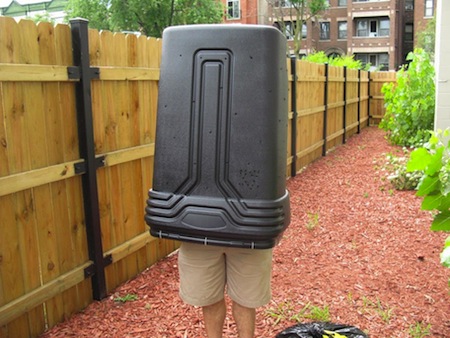
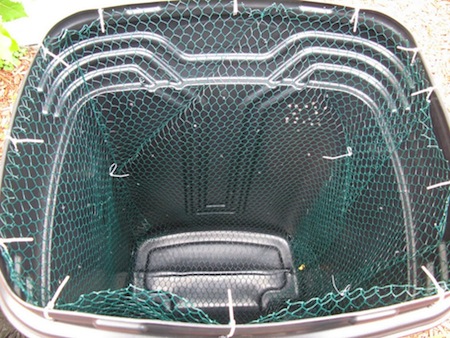
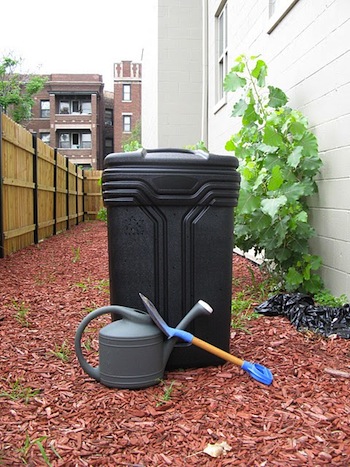
Before I became a SAGE Ambassador at the end of Spring Quarter last year, I contacted the Office of Sustainability on behalf of the Alpha Epsilon Pi (AEPi) fraternity. Because of my interest in reforming in-house and party practices to be more environmentally conscious, the fraternity elected me to institute pro-sustainability changes as co-house manager of our South Campus house.
Ari Epstein of AEPi
Members of the Office of Sustainability made my task very easy by providing advice on gradually implementing reforms in a large social organization like a fraternity and information on electronic, print, and city resources. Despite the lack of higher quality of photos in this series, I am pleased to share AEPi's successful sustainability reforms with the University community in order to generate interest among other large social RSOs to reduce their carbon footprint and overall environmental impact and to streamline existing sustainability measures like recycling. 
Composting made fun

Ari lined the converted trash can with mesh to help keep pests at bay
Beginning shortly after my SAGE training, I introduced small changes to the fraternity by increasing in-house recycling, promoting awareness of electricity and water usage, and starting an aerobic composting bin made out of a converted 45-gallon plastic trash can lined with wire mesh (above). I now use old deli or produce bags to store fresh food scraps in the refrigerator until I bring down my weekly collection of waste and recyclables. Because I have a continuing ant problem and am cautious to develop a gnat problem, this system seems to work well.

The completed DIY compost bin next to AEPi's South Campus house
Click here to learn about AEPi's sustainable practices for social gatherings in part two of the series.
Our recycles bike share partner, Blackstone Bicycle Works, is pleased to offer a new series of bicycle knowledge, building, and maintenance classes.

Foster Holistic Understanding: $40 per class, $140 for all four.
These classes are in-depth explorations of the four main component groups that make up your bicycle
(you'll get a tool and reference guide to take home):
Drivetrain: 11/4, 12/2, 1/6, 2/3
This class covers the heart of your bike. Learn the ins and outs of gears, shifters, and derailleurs.
Brakes: 11/11, 12/9, 1/13, 2/10
This class covers all that is involved in the set-up, maintenance of all brake types.
Wheels: 11/18, 12/15, 1/20, 2/17
The spoked wheel is surprisingly complex! Learn to tame and true this wild beast!
Bearings: 11/23, 12/20, 1/27, 2/24
Learn to adjust, maintain, and rebuild hubs, headsets, and bottom brackets. These little b.b.s are important things!
In addition, Blackstone Bicycle Works will offer a five week intensive workshop of building a bike from scratch beginning 11/9. Please call or email the shop for more information.
All classes require advance registration. Read below for class details.
If interested, please contact:
Blackstone Bicycle Works
773.241.5458
blackstonebikes@gmail.com
If interested, please contact:
Blackstone Bicycle Works
773.241.5458
blackstonebikes@gmail.com

Develop Working Knowledge: $40
This single-session weekly class covers the basics. You will learn what every gear, link, and bolt is called and how it functions. Truth be told, you need to know how it works before you can fix it. We'll cover the basic repairs to keep you rolling: flat fixes, patch tubes, adjust brakes. You'll get a multi-tool and a reference guide to take home. Once a week, 6-9pm, Wednesdays.Foster Holistic Understanding: $40 per class, $140 for all four.
These classes are in-depth explorations of the four main component groups that make up your bicycle
(you'll get a tool and reference guide to take home):
Drivetrain: 11/4, 12/2, 1/6, 2/3
This class covers the heart of your bike. Learn the ins and outs of gears, shifters, and derailleurs.
Brakes: 11/11, 12/9, 1/13, 2/10
This class covers all that is involved in the set-up, maintenance of all brake types.
Wheels: 11/18, 12/15, 1/20, 2/17
The spoked wheel is surprisingly complex! Learn to tame and true this wild beast!
Bearings: 11/23, 12/20, 1/27, 2/24
Learn to adjust, maintain, and rebuild hubs, headsets, and bottom brackets. These little b.b.s are important things!
In addition, Blackstone Bicycle Works will offer a five week intensive workshop of building a bike from scratch beginning 11/9. Please call or email the shop for more information.
